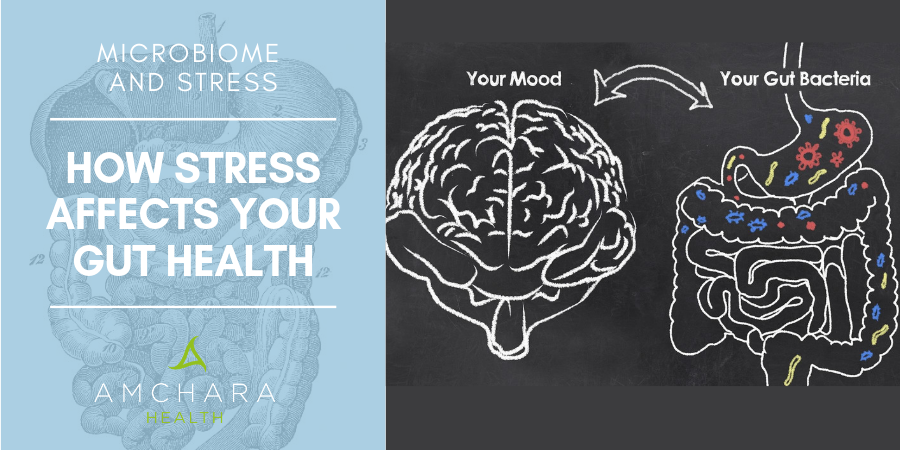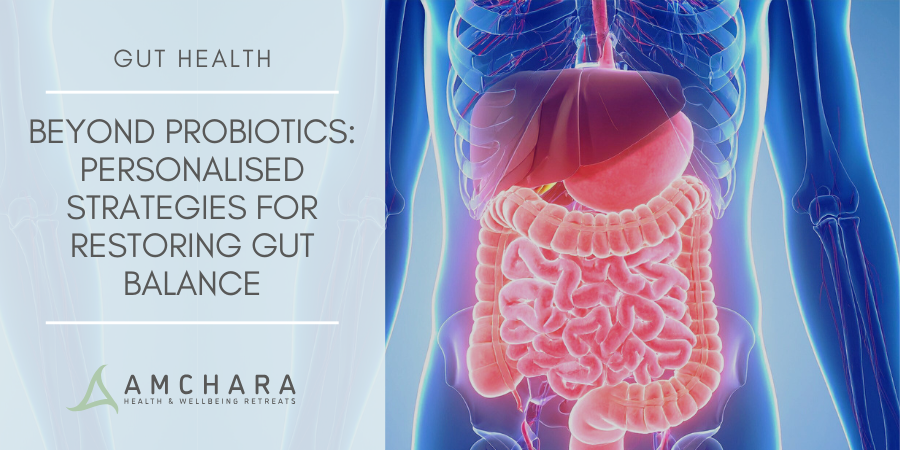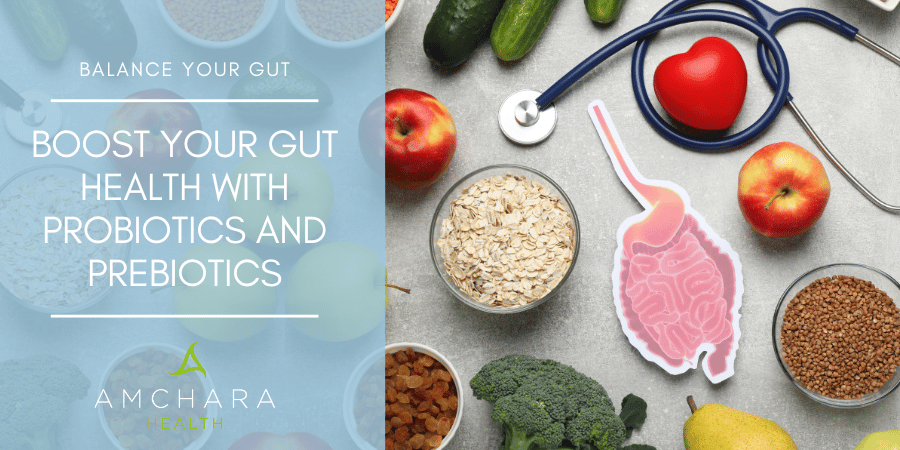Topics Covered in this article:
- The stress response
- Your personal microbiome
- The gut/brain axis
- The gut/brain/microbiome axis
- The connection between stress and the microbiome
- How can stress affect your microbiome?
- How can the microbiome alter your response to stress?
- Psychobiotics
- Leaky gut and stress
- Personalised Health for your personal microbiome
Stress. It’s all around us and we can’t avoid it, but it affects each one of us differently.
Stress can be defined as anything which threatens the steady state of the body.
It can be physical or emotional, and we can generate stress from within ourselves.
Some degree of stress is useful as it acts as a motivator, but it’s our reaction and response to it which differs.
When stress becomes extreme or ongoing it can create imbalances in the body which can lead to health problems.
We always provide you with both insightful information and evidence-based content to provide you with actionable knowledge and tips you can trust, to help you on your journey to optimal health
In this article we’re going to look at stress and its intimate relationship with our microbiome, the bacteria that live in the gut.
The stress response
When we encounter stress, the body senses it as a danger. It reacts with a mechanism known as ‘fight or flight’.
This prepares the body to either tackle an adversary or run away.
Our stress response is controlled by the adrenal glands which are located on top of the kidneys.
The adrenals respond to perceived stressors by secreting a number of different hormones, including cortisol, DHEA, adrenaline and noradrenaline.
These hormones work together to mobilise stored energy from our liver, increase heart rate and blood pressure and divert blood to the muscles and brain, making us more alert and delivering oxygen and sugar.
On the other hand the hormones slow our digestion as blood is diverted to our extremities.
Together our stress hormones help us to deal with immediate hazards.
Think of your stress response as an emergency response system, providing you with extra energy to prepare you to react to danger.
These hormonal responses are often called the alarm stage of stress.
The physiological changes are intended to manage a short-term danger, such as facing a ferocious dog, and once it’s gone away, levels of the stress hormones would naturally drop and the adrenal glands then enter a period of recovery.
The problem is, in our fast-paced world, one stress follows fast on the heels of another – or one form of stress is continual.
Emails and messages are continuously pinging in demanding attention, and work pressures never let up.
This leads to the main stress hormone, cortisol, being continually elevated.
Eventually, after constantly pumping out hormones, the adrenal glands start to tire out, stress hormones drop and symptoms of long-term stress such as extreme tiredness, burnout and poor immune function begin to show.
Your personal microbiome
When we talk about the microbiome, we mean the trillions of bacteria which live in your digestive system.
You might hear them referred to as the digestive bacteria or gut flora.
Far from being unwelcome invaders in your body, it’s now recognised they play a crucial role in your immune health, digestion, nutrient production and detoxification processes.
Although estimates of the number of bacteria residing within the gut are constantly changing, what is known is the number of bacteria outnumber the cells in the human body.
Their total weight is around that of the brain, between one and two kilograms.
It’s believed a combination of over 2000 different species may live in the digestive system – predominantly in the large intestine.
Every one of us has a microbiome and in every one of us it’s unique.
When we are born, our mother passes on the beginnings of our microbiome.
As we develop, the population of bacteria is affected by outside influences such as our food choices, stress levels and medical drugs.
This means the ratio and quantity of various species of bacteria is different for each of us.
Some species of bacteria support our health, and are popularly called beneficial bacteria, while other types aren’t so friendly.
Not only do the unfriendly bacteria not confer these health benefits, but a bit like unwelcome guests at a party or a toxic office colleague they actually change the atmosphere – in other words the environment inside your gut – meaning it’s harder for the beneficial types to thrive.
The microbiome plays such an important role in our health that these differences can affect your health in complex ways.
Naturopaths have recognised the importance of the microbiome for many years.
Although it’s no longer frontpage news that gut bacteria is important for gastrointestinal health, science is now discovering the influence of the microorganisms we play host to lies much further afield and may even affect our relationship with stress.
The gut/brain axis
You may have heard of the gut/brain axis. Research is increasingly demonstrating that the digestive system influences the brain and vice versa.
Who hasn’t had a gut reaction to a situation, or even simply by anticipating a stressful situation has experienced changes in their digestion?
Your gut has its own complex network of millions of nerves along the length of the digestive tract, called the enteric nervous system.
It’s the second largest collection of nerves cells outside your brain and it acts independently of the brain and spinal cord.
It’s not called the second brain for nothing.
The gut and the brain are connected to each other by nerves such as the vagus nerve, which is a major nerve running from the brain via the neck and chest to the abdomen.
This nerve enables the digestive tract and the brain to have a two-way dialogue, so each influences the other.
The gut and the brain also communicate by alterations in the immune system and by hormone signalling.
The gut/brain/microbiome axis
Scientists have now extended this concept to include the microbiome and have called it the gut/brain/microbiome axis (1).
Studies have confirmed your personal population of bacteria have a profound influence on your mental wellbeing and how you respond to stress.
They appear to be a critical component affecting the communication between the brain and the gut (2).
Although the precise way they do this is still unclear, the microbiome appears to be capable of manufacturing chemicals which assist with this communication.
The connection between stress and the microbiome
It’s widely accepted that stress can adversely affect our digestion, but recent studies have discovered it can specifically alter the population of bacteria living within our gut.
Scientists are also now discovering this relationship works both ways, with research examining the role the microbiome can play in our stress response.
How can stress affect your microbiome?
Although all of us play host to different proportions of bacteria, there are largely two dominant classifications, which are called Bacteroidetes and Firmicutes.
Stress, such as overcrowding, heat and noise has been found to alter the composition of species in the microbiome (3).
Immediately after the stressful situation, the population of the beneficial Bacteroidetes was reduced, while a pathogenic bacteria, Clostridium, increased in number.
Even short-term exposure to stress can influence the relative proportions of bacteria (4).
It’s not clear exactly how stress affects your gut bacteria, but it may be as a result of several mechanisms, including alterations in the speed the intestinal contents move through the gut and the action of hormones which affect the gene expression of the bacteria.
How can the microbiome alter your response to stress?
We now know stress can alter the microbiome, but as a two-way process, the microbiome can also alter the way in which you respond to stress.
Scientists have discovered animals raised in a sterile environment and therefore lacking the normal intestinal bacteria released higher levels of stress hormones when experiencing mild stress, such as being placed in an unfamiliar location.
These animals generally tend to be more anxious.
These hormonal changes were normalised when probiotic bacteria or foods high in fibre to encourage the growth of healthy bacteria were given to replenish the microbiome (5).
When scientists transplanted gut bacteria from animals who were naturally more anxious and less likely to spontaneously explore their surroundings into others which did not display heightened anxiety, the recipient animals became more anxious and less likely to explore.
The same held true vice versa (6).
Other studies have examined the differences in stress response following administration of antibiotics, which effectively wipe out the bacteria in the gut, decreasing the diversity of the species.
The antibiotics altered levels of chemicals which communicated along the gut/brain/microbiome axis (7).
It’s worth remembering it can take many months for the population to normalise itself after antibiotics.
A recent small study found after just one four day course of broad-spectrum antibiotics, it took six months for the microbiome to recover, with some species of bacteria never reappearing and other, undesirable species appearing which weren’t present before (8).
These types of bacteria form spores and are opportunistic – emerging only when other species have been eradicated.
It appears the balance of our gut bacteria in early life is particularly important to later health.
Our exposure to antibiotics as an infant, whether or not we were breastfed, if we were a natural or Caesarean birth, our childhood food choices and exposure to pollutants can all affect our microbiome, as can the genetic blueprint handed down from our parents.
Research tells us the microbiome may even affect the way in which our brain develops, particularly the areas of the brain responsible for emotions (9).
All of this demonstrates the health of our microbiome plays an important role in stress-related conditions including anxiety.
Psychobiotics
All this exciting research has led to the approach of targeting the microbiome in order to positively impact mental wellbeing.
Probiotics – certain strains of bacteria which make up a healthy microbiome – or prebiotics, which are sources of indigestible fibre to encourage the growth of the desirable bacteria, are known as psychobiotics.
One study gave a prebiotic supplement to 45 healthy volunteers for just three weeks, while their food intake remained unaltered (10).
Cortisol levels upon waking are generally higher during times of stress, particularly owing to the anticipated stress of the day.
The researchers found participants’ waking cortisol levels were reduced.
Leaky gut and stress
One mechanism which has been put forward to explain the gut/brain link in stress related disorders concerns disruptions to the gut lining barrier.
The normal tight junctions between the cells lining the intestines become larger, allowing bigger molecules and pathogenic bacteria access to the body, causing inflammation.
Known as leaky gut this can be caused by excess stress, as well as poor food choices, antibiotic use, smoking and alcohol.
The health of the digestive lining is closely linked to the health of our microbiome.
The beneficial bacterial strains produce substances known as short-chain fatty acids (SCFAs) when they digest fibre.
These SCFAs are used as fuel by the cells lining the gut wall. One study found giving SCFAs reduced stress-based behaviour, as well as reducing intestinal permeability caused by ongoing stress (11).
Personalised Health for your personal microbiome
From the above we can see we’re not carbon copies of each other.
Due to differences in our microbiome, our response to stress is physiologically different.
Any therapeutic intervention is more likely to succeed if it recognises these individual differences.
A number of tests are available to assess both your stress response and your gut health.
A hormone saliva test is a non-invasive method to determine the levels of cortisol and DHEA over a 24-hour period.
This test looks at fluctuations in adrenal function compared to your circadian rhythm in order to assess where your adrenal glands currently are in respect of the stages of stress response.
Salivary hormone levels are more representative of what’s happening inside your cells than are blood levels, since blood remains outside our cells.
A heart rate variability test (HRV) measures the interval between your heartbeats.
It is an accurate indicator of your body’s resilience and flexibility and your response and adaptation to stress. The natural variability of the heart rate decreases with stress.
The composition of your personal microbiome can be tested by sending off a sample of your stool.
This test can also detect whether your gut lining has become too permeable.
With your help let’s continue the conversation.
Did you find this article useful?
Please share your thoughts in the comments.
By Cathy Robinson BScDipNutMed
READ THIS NEXT:




